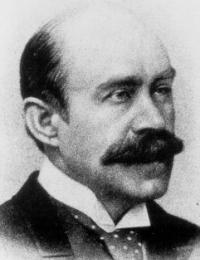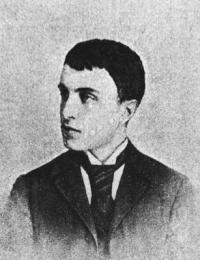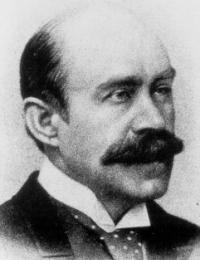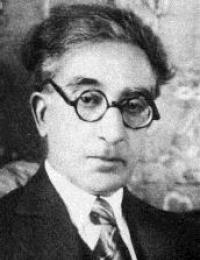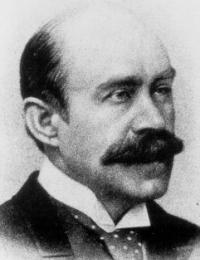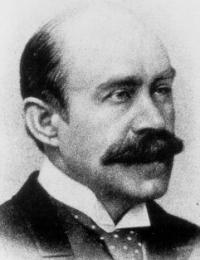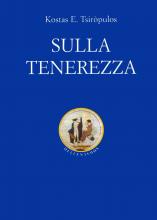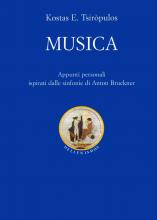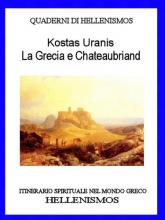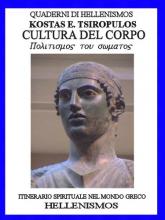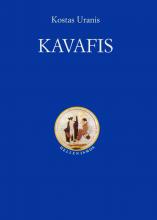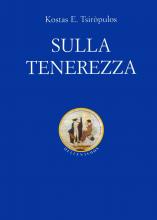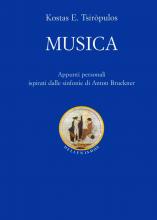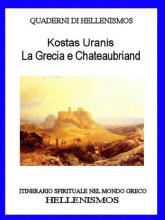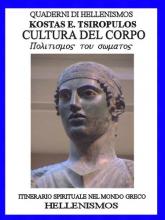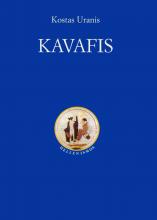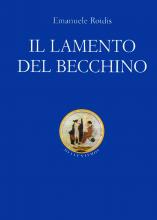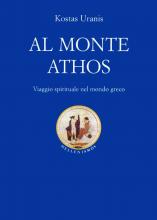AA. VV.: THE SYMBOL OF FAITH (in English / Greek)
I believe in One God, the Father, Almighty,
maker of heaven and earth and of all things visible and invisible.
And in One Lord Jesus Christ, the only begotten Son of God,
begotten of the Father before all ages;
Light of Light, very God of very God,
begotten not made, being of one essence with the Father,
by whom all things were made.
AA. VV. : WHY IS GREEK SUCH A GREAT LANGUAGE ?
I can only suppose that the normal language of Greek poetry is in itself in some sense sublime. Most critics accept this as an obvious fact, yet, if true, it is a very strange fact and worth thinking about. The sound of a great deal of Greek poetry, either as we pronounce it, or as the ancients pronounced it, is to modern ears almost ugly. It depends partly, perhaps, on the actual structure of the Greek language: philologists tell us that, viewed as a specimen, it is in structure and growth and in power of expressing things, the most perfect language they know. And certainly one often finds that a thought can be expressed with ease and grace in Greek which becomes clumsy and involved in Latin, English, French or German. But neither of these causes goes, I think, to the root of the matter.
A. Paraschos: Ο ΓΥΙΟΣ ΤΟΥ ΒΡΥΚΟΛΑΚΑ
Angelos Christoforos: ΧΡΙΣΤΙΑΝΟΣ ∆ΑΙΜΟΝΙΖΟΜΕΝΟΣ
Angelos Kalogeropoulos: Η ΕΛΛΗΝΙΚΗ ΓΛΩΣΣΑ
G. P. Paraskeuopoulos: ΚΩΝΣΤΑΝΤΙΝΟΥΠΟΛΙΣ (δεύτερο μέρος)
M. Begzos: Ο ΗΡΑΚΛΕΙΤΟΣ ΚΑΙ Η ∆ΙΑΛΕΚΤΙΚΗ ΟΥΣΙΟΚΡΑΤΙΑ
D. Ch. Bousinakis: ΤΟ ΟΝΕΙΡΟ (Il sogno)
John Cuthbert Lawson (1874-1935) : MODERN GREEK FOLKLORE AND ANCIENT GREEK RELIGION A STUDY IN SURVIVALS
The sources of information most obviously open to scholars of ancient Greek religion are the Art and the Literature of ancient Greece; and the idea that modern Greece can have any teaching to convey regarding the beliefs of more than two thousand years ago, seems seldom to have been taken into account. Just as we speak of ancient Greek as a dead language, and too often forget that many of the words and inflexions currently in popular use , are identical with those of the classical period and even of the Homeric age, while many others, no longer identical, have undergone but small modifications, no longer identical, so are we tend to think of Greek paganism as a dead religion, and do not inquire whether the beliefs and customs of the modern peasant may not be a direct heritage from his classical forefathers. And yet, if any such heritage exist, there is clearly a fresh source of knowledge open to us, from which to supplement and to correct the lessons of Art and Literature.
Walter Pater: SEBASTIAN VAN STORCK
It was a winter-scene, by Adrian van de Velde, or by Isaac van Ostade. All the delicate poetry together with all the delicate comfort of the frosty season was in the leafless branches turned to silver, the furred dresses of the skaters, the warmth of the red-brick house-fronts under the gauze of white fog, the gleams of pale sunlight on the cuirasses of the mounted soldiers as they receded into the distance. Sebastian van Storck, confessedly the most graceful performer in all that skating multitude, moving in endless maze over the vast surface of the frozen water-meadow, liked best this season of the year for its expression of a perfect impassivity, or at least of a perfect repose.
AA. VV.: THE SHADOW THEATER
In the course of the last decades, Greek shadow theater was at last officially recognized as an fundamental element of the culture of modern Hellenisms. After a long period of decline, it is nowadays enjoying new popularity, many theaters for its performances have been built, magazines and newspapers publish articles and essays about it. Surprisingly enough, Karagiozis, the sloppy character of almost every plot, has turned out to be some sort of a national symbol, representing the individual Greek of unlimited ambition, who fights against overpowering odds with great determination and who in the end makes it thanks to his shrewdness and creativity. Karagiozis stands for the incarnation of the supple spirit that has allowed Greece to continue to exist through centuries of oppression.
Walter Pater: DENIS L'AUXERROIS (in inglese)
Almost every people, as we know, has had its legend of a “golden age” and of its return – legends which will hardly be forgotten, however prosaic the world may become, while man himself remains the aspiring, never quite contented being he is. And yet in truth, since we are no longer children, we might well question the advantage of the return to us of a condition of life in which, by the nature of the case, the value of things would, so to speak, lie wholly on their surfaces, unless we could regain also the childish consciousness, or rather unconsciousness, in ourselves, to take all that adroitly and with the appropriate lightness of heart. The dream, however, has been left for the most part in the usual vagueness of dreams: in their waking hours people have been too busy to furnish it forth with details.
C. P. Cavafy: ARS POETICA (in inglese)
After the already settled Emendatory Work, a philosophical scrutiny of my poems should be made. Flagrant inconstancies, illogical possibilities, ridiculous exaggerations should certainly be corrected in the poems; and where the corrections cannot be made the poems should be sacrificed, retaining only any verses of such sacrificed poems as might prove useful later on in the making of new work. Still the spirit in which the Scrutiny is to be conducted should not be too fanatical. The profit of personal experience is undoubtedly a sound one; but were it strictly observed it would limit tremendously literary production and even philosophical production.
Elias Kefalas: LA POESIA DI C. P. KAVAFIS (in greco)
Walter Pater: LUCA DELLA ROBBIA (London 1893)
The Italian sculptors of the earlier half of the fifteenth century are more than mere forerunners of the great masters of its close, and often reach perfection, within the narrow limits which they chose to impose on their work. Their sculpture shares with the paintings of Botticelli and the churches of Brunelleschi that profound expressiveness, that intimate impress on an indwelling soul, which is the peculiar fascination of the art of Italy in that century. Their works have been much neglected, and often almost hidden away amid the frippery of modern decoration, and we come with some surprise on the places where their fire still smoulders. One longs to penetrate into the lives of the men who have given expression to so much power and sweetness.
AA. VV.: ΤΟ ΣΚΑΝΔΑΛΟ ΤΟΥ ΜΟΝΟΤΟΝΙΚΟΥ ΣΥΣΤΗΜΑΤΟΣ (τέταρτο μέρος)
Walter Pater: SANDRO BOTTICELLI (London 1870)
In Leonardo’s treatise on painting only one contemporary is mentioned by name – Sandro Botticelli. The pre-eminence may be due to chance only, but to some will rather appear a result of deliberate judgment; for people have begun to find out the charm of Botticelli’s work, and his name, little known in the last century, is quietly becoming important. In the middle of the fifteenth century he had already anticipated much of that meditative subtlety, which is sometimes supposed peculiar to the great imaginative workmen of its close. Leaving the simple religion which had occupied the followers of Giotto for a century, and the simple naturalism which had grown out of it, a thing of birds and flowers, he sought inspiration in what to him were works of the modern world, the writings of Dante and Boccaccio, and in new readings of his own of classical stories: or, if he painted religious incidents, painted them with an under-current of original sentiment, which touches you as the real matter of the picture through the veil of its ostensible subject.
Kostas E. Tsiropoulos: SULLA TENEREZZA
Non si era mai sentito così in accordo con l'intero creato. Dio gli parlava con il suo silenzio. E allora, come una lancia di cristallo, sulla riva del mare cadde il primo raggio di sole, proprio il primo, l'unico. Cadde e colpì dolcemente, con tenerezza, una bianca pietra levigata. E la pietra, onorata, brillò, stendendo al sole un anello d'argento. Ammutolito per la gioa, si chinò sulla pietra, la sollevò dal suo letto, se l'appoggiò ad una guancia: una pietra millenaria in rapporto con l'uomo di breve durata.
Kostas E. Tsiropoulos: MUSICA
Quando smarrì l'uomo che lo aveva portato al mondo, i sensi gli furono tutti amareggiati dal silenzio. Il creato intero, imbavagliato dal mistero della morte e dal paradosso dell'amore, taceva per lui.
Ma un giorno, in quel sotterraneo del tempo in cu si raccoglievano le sue lacrime, risuonarono rifrangendosi alcuni temi - frammenti d'una musica dimenticata: erano frammenti delle sinfonie di Bruckner.
Kosta Uranis: LA GRECIA E CHATEAUBRIAND
Quando Chateaubriand, varcato il passo tra Koridalòs e il colle di Profitis Ilias, si trovò dinanzi alla piana di Atene, si fermò, estatico e commosso, come se avesse raggiunto la meta suprema. Non era il culto per l'antichità ellenica o il pensiero di essere arrivato nella culla di una grande civiltà a provocare in lui quell'estasi e quella emozione. Ciò che vedeva lo abbagliava come una rivelazione.
Kostas E. Tsiròpulos: CULTURA DEL CORPO
A Delfi, davanti all'Auriga, una mattina d'autunno. La pace assoluta mi dona una rara facoltà intuitiva. Il mio essere è predisposto ad accogliere nella maniera più assoluta l'effusione erotica di cui è preda per conoscere – sebbene possa essere bruciato, fulminato da quel soffio di conoscenza. Tale soffio di libertà che fa schiudere il mio essere mi permette di vedere tutto ciò che, per tutta la vita, mi era rimasto celato, enigmatico.
Kosta Uranis: KAVAFIS
Mi aprì la porta un cameriere nero e mi trovai in un appartamento completamente al buio. Il corridoio era una corrente di oscurità, i mobili, i quadri e gli oggetti erano avvolti da ombre che si erano sedimentate su di essi come la polvere. Una luce fioca, che proveniva da un'altra stanza, rendeva quell'oscurità ancora più misteriosa. Avevo l'impressione di ritrovarmi nell'appartamento di un eroe di un racconto fantastico di Hoffman... Il Kavafis che mi accolse aveva un aspetto curioso: sembrava una vecchia litografia scivolata giù dalla cornice.





